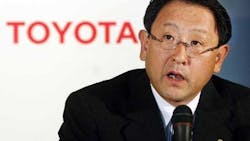Toyota Boss's Pay Hike Still Leaves Him Trailing
TOKYO - The boss of the world's biggest automaker, Toyota (IW 1000/8), saw his pay packet swell by a third last year, filings showed Tuesday, but to a level that sees him still earning only a fraction of his overseas counterparts.
The Japanese auto giant paid its chief Akio Toyoda a total of 184 million yen (US$1.86 million) in salary and bonuses, according to a filing from Japan's Financial Services Agency on Tuesday.
Toyoda's remuneration also includes dividends from shares he owns in the company, which was founded by his great-grandfather.
His salary was up about 35% from the previous 12 months after overseeing a tripling of net profit in the latest fiscal year to March, to 962.1 billion yen ($9.8 billion). Toyota shares rose by about one-third over the same period.
Carlos Ghosn, head of rival Nissan, Japan's No. 2 automaker, retained his ranking as possibly Japan's best-paid CEO, raking in 988 million yen in the fiscal year to March.
That was a modest 0.1% rise from a year earlier, shareholders were told at the company's annual meeting on Tuesday. Investors voted to keep him on for another two-year term.
"Companies must employ and retain top leaders," Ghosn told investors last year in response to questions on his pay package.
Ghosn has been credited with rescuing Nissan from the brink of bankruptcy, which is frequently cited as the reason for his above-average pay.
But even his handsome package was overshadowed by his counterparts in the United States where Ford CEO Alan Mulally was paid $21 million in 2012, while General Motors' chief Dan Akerson received $11.1 million, U.S. media has reported.
Pay packages for Japanese executives -- and the salary gap between a firm's lowest and highest-paid workers -- tends to be a fraction of levels seen North America and Europe, where top pay has attracted a growing chorus of criticism.
In April, shareholders in Swiss private bank Julius Baer flatly rejected the bank's plan for executive compensation in a non-binding vote, amid outrage over huge pay packages.
That came just a month after Swiss voters massively came out in favor of a new law limiting executive pay and bonuses, among various measures taken across Europe to shrink CEO pay.
And earlier this year, a government auditor blasted the U.S. Treasury for approving high levels of top-level pay at firms bailed out in the financial crisis.
In Japan, CEO compensation of around $1 million or less is not uncommon while some executives take pay or bonus cuts if the firm hasn't performed.
Last month, Sony (IW 1000/39) said dozens of senior executives including CEO Kazuo Hirai would give up their bonuses this year to atone for a slump in its embattled electronics unit.
Copyright Agence France-Presse, 2013
About the Author
Agence France-Presse
Copyright Agence France-Presse, 2002-2025. AFP text, photos, graphics and logos shall not be reproduced, published, broadcast, rewritten for broadcast or publication or redistributed directly or indirectly in any medium. AFP shall not be held liable for any delays, inaccuracies, errors or omissions in any AFP content, or for any actions taken in consequence.
